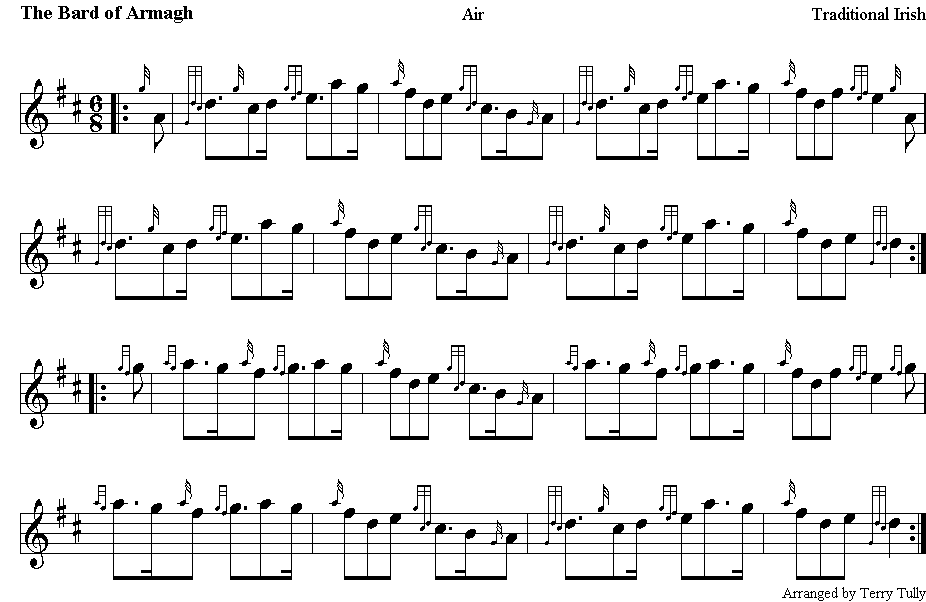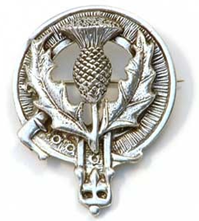|
The Bard of Armagh
is an Irish ballad. It is thought to be Patrick Donnelly.
The Williamite ‘settlement’ following the defeat of the Irish at
the Boyne saw extremely harsh laws introduced to suppress the
Catholic faith and the priests and bishops who helped maintain
and propagate it.
The subordinate Protestant Dublin parliament in 1697 passed the
Popery Act with the aim of expelling all Catholic bishops and
higher clergy. Priests who agreed to swear allegiance to the
Crown and abjured the right to go about their priestly duties,
to be secular rather than religious, and who registered with the
authorities, who could then monitor their activities, were
permitted to stay. A small number agreed to these conditions
rather than leave their flock without spiritual guidance. The
penalty for non-compliance was execution or transportation and
those who would not accept these conditions had to go into
hiding. It was this period that saw ‘mass-rocks’ flourishing.
By the turn of the century, Dr Patrick Donnelly, who ministered
in South Armagh, was one of only two Catholic bishops said to be
operating in Ireland. He of course had to operate in
disguise. His normal disguise was that of a wandering
minstrel. He assumed the title of Phelim Brady, the Bard of
Armagh. The illustrious title lives on in several forms, notably
in song, which has itself seen many incarnations.
Patrick Donnelly was born in Desertcreaght, Cookstown, County
Tyrone in 1650. Some part of his education was at the hands of
the Jesuits at their hedge-school in Drogheda. He was ordained
to the priesthood by Archbishop Oliver Plunkett at Dundalk in
1673. Recognising his considerable academic ability the
Archbishop sent him to Paris for further study. Again on his
return the Archbishop appointed him (c. 1679) as Bishop of
Dromore. He acted as parish priest too to Lislea and is said to
have resided at Doctor’s Quarters (named after him). When not
resident there as an ordinary peasant he travelled on foot (as a
minstrel) in the Counties of Louth, Armagh, Down Tyrone and
Derry, guiding, exhorting and advising his outlaw priests and
his unfortunate people.
Bishop Donnelly’s hut of refuge
(shown above)
was said to be located on the site of the house of the last
native Irish speaker in the area, Sally Humphrey (who died c.
1918). Interviewed by Fr Laurence Murray (local historian,
folklorist and archivist) Sally became indignant at the ‘mere
doggerel’ of the words of that song (Bard of Armagh) that he
recited to her. She had a clear recollection of an Ulster Gaelic
folksong of that theme being sung to her in her youth, with the
same haunting air that, in comparison, she regarded the modern
ballad in English a poor, unworthy and senseless imitation.
Despite his mastery of disguise Bishop Donnelly did not forever
escape detection. On 15 September 1706 he was arrested in Father
John MacParlan’s house in Lathbirget by Walter Dawson. It was
well into the following year before he was released for lack of
evidence against him. He immediately resumed his sacred
mission. He consecrated Edmund Byrne as Archbishop of Dublin and
elevated another priest to the Bishopric of Killala.
He remained in Doctor’s Quarters until his death in 1716 at the
age of 66. The great devotion in which he was held was
illustrated in the funeral cortege afforded to him by his loving
people. Having to act secretly by night for fear of the
authorities, still they carried his coffin from parish to parish
across the hills of Armagh and Tyrone and laid him to rest
eventually in his native parish and in his own family grave at
Desertcreaght.
Along with Saint Oliver Plunkett, Dr Patrick Donnelly, the Bard
of Armagh was one of the most revered Bishops of all Penal Days.
The song itself, like many heroic, rebel outlaw ballads, dates
from the mid 19th century.

Lyrics
|
Oh list' to
the lay of a poor Irish harper,
And scorn not the strings in his old
withered hands,
But remember those fingers, they once
could move sharper,
To raise up the strains of his dear
native land.
It was long
before the shamrock, dear Isle's lovely
emblem,
Was crushed in its beauty by the Saxon's
lion paw,
And all the pretty colleens around me
would gather,
Called me their bold Phelim Brady, the
Bard of Armagh.
How I love
to muse on the days of my boyhood,
Though four score and three years have
fled by since then.
Still it gives sweet reflection, as
every young joys should,
For the
merry-hearted boys make the best of old
men. |
At a fair or
a wake I would twist my shillelagh,
And trip through a dance with my brogues
tied with straw.
There all the pretty maidens around me
would gather,
Called me their bold Phelim Brady, the
Bard of Armagh.
In truth I
have wandered this wide world over,
Yet
Ireland's my home and a dwelling for
me.
And, oh, let the turf that my old bones
shall cover
Be cut from the land that is trod by the
free.
And when
Sergeant Death in his cold arms doth
embrace me,
And lulls me to sleep with old 'Erin-go-Bragh',
By the side
of my Kathleen, my dear pride, oh, place
me,
Then forget
Phelim Brady, the Bard of Armagh. |
|
|
|



